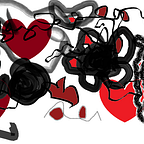Sex-Race Tango: Some thoughts post the march
The tango, a dance combining both African and European culture, involves partnering, the interlocking of legs, and melding of bodies in a melodic rhythm. A researcher, Kruetz (2008), found tango dancers reported physical, emotional and social benefits, presenting an interaction having both physical and psychological benefits.
The sex-race tango, a dance, combines dueling cultures; one colonized and the other colonizer. Two identities, sometimes acting as partners, an interlocking psyche, and movements. The sex-race tango somewhat forges two identities in a fight against oppression. However, this duality may not guarantee physical and emotional benefits, but rather a constant negotiation, point of stress, an intricate dance.
The sex-race tango is the intersection between being Black and a woman in the United States. Black women who can sex-race tango can dance, which indicates they move between sex-race successfully. Herein lies the challenge; it is extremely difficult to handle this duality, the dueling of two selves, race and sex. Some Black women must negotiate the cause; choose whether women’s liberation in the United States also translates into the liberation of Black people.
The space I exist requires a deep love for Black people. I am in a battle of fighting institutional, cultural, and individual racism in ways that aim to reprogram my psyche and the collective psyche of a people. This struggle will often translate to commenting on a system that has symbolically disemboweled and castrated Black men and mangled the uterus of Black women.
The space I exist requires a deep love for Black women. I am in a constant battle against intergroup and intragroup violence — sometimes sexual and, more often, psychological and physical. Black women, bodies dangling from trees, plucked and primed for all to lust after. We, Black women, who enroll in higher education institutions at higher rates than our Black men but whose annual pay is the lowest, leading households, and forced to wait while men make decisions over our uterus.
When I attended the Women’s March on Saturday, January 21st, one of my friends created a sign, “I birthed you.” We walked in a sea of multiethnic women and then, some commented on how wonderful this march was for women. Here we were, a part of the various chants, mostly women, and some men, raising their fist to advocate for women, vagina liberation, and uterus freedom. We continued until one young white woman, walking with a sea of others looks up to read the sign and then yells, “No you didn’t.” Another one of my friends, a Black woman, proceeded to respond, “Yes, I kind of did.”
This was a thoughtful moment; the short interaction was a reminder of this need for liberation, this need for allies, this need to link our cause to others. Somehow, in that interaction, I realized how some white women would never really get it. They want to be our saviors still; we excite them with our knowledge of racial struggles, they tolerate our stories, they shake their heads in disgust but may whisper afterward and hurry off to their white spaces free from our black ones. They do not mind walking alongside Black women, as long as we remember our place, one-step behind them. And, if we dare to move forward or advance ourselves in any way, they would be there to remind us — you can get in this space but please do not get in my space.
I am extremely proud to be black; I posted this in a previous commentary. When I attended the march, I decided to wear a black t-shirt, which read, “I am because we are” and red, black, and green colors depicting the liberation fist with “proud Afrikan” at the bottom. I needed to remind those in attendance of my blackness, my black womanness. I am not denouncing the value of the march, women pride, but this comes with a caveat.
I am committed to strengthening the relationship that exists between Black men and women. I do not want to participate in “men bashing” but want to find ways for Black people to see value, love, and freedom. This transcends all sexual identities; aims to recognize the trauma that diminishes how we relate to each other — it propagates its hands in ways that will block our ability to move collectively towards building our communities and political power.
At the end of the tango, the man may throw the woman up into the air, cross her over his knees and lean her back as he stares over her submissive form. I am not trying to continue the sex-race tango, sex will not rule over my blackness. I am trying to fuse it into something like Muchongoyo.
#iownmyveve #blackveverules
